
Qcells’ solar panel additions to the EPEAT registry activates the Federal Acquisition Regulation (FAR) -- the first time for solar panels -- which, according to a US Environmental Protection Agency rule, requires the federal government to procure products that meet important sustainability requirements when three or more EPEAT certified products by two or more manufacturers in one category are available.
In 2021, the Biden Administration announced plans to electrify federal buildings and fleets by 2050. EPEAT will now steer billions of dollars in federal government purchasing power toward sustainably made solar manufactured by leaders in the domestic solar industry.
“After over two years of striving to make more sustainable solar panels, we’re proud to have achieved this huge accomplishment,” said Kelly Weger, Senior Director of Sustainability at Qcells. “The EPEAT ecolabel will make it easy for customers who value transparency and sustainability to find our products and work with us. Overall, customers large and small now have a resource that will help them hit their sustainability goals faster while supporting U.S. jobs.”
Today the GEC also announced it will require all EPEAT registered solar panels and inverter products to have an embodied carbon level below a given threshold to become certified. This new requirement will ensure manufacturers are considering their carbon footprint when making solar panels.
The GEC’s carbon requirements can ensure that its EPEAT-registered products are at least 25% less carbon intensive than non-EPEAT registered products. The inclusion of low-carbon standards in EPEAT aligns with Qcells’ sustainability priorities as the company pursues its goal of onshoring the full solar supply chain in the United States.

